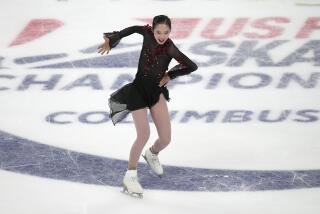Mabel Fairbanks, 85; Black Ice Skater
From a huge living room window overlooking New Yorkâs Central Park, Mabel Fairbanks, a baby-sitter young enough to need a baby-sitter of her own, would look out at the skaters twirling, jumping and gliding on the frozen lake. Just days before, the girl--too young to get a job and homeless-- had been sleeping in the park when a woman spotted her and offered her the work.
But Fairbanks ached to skate with the other children. When she had the time, she took to the ice at the parkâs free skating sessions in used skates, two sizes too big, that she bought for $1 at a pawn shop.
She couldnât afford lessons. And even if she could have, the rinks wouldnât have allowed her in. It was the 1930s and Fairbanks, an African American, was repeatedly told she had no business wearing skates in an era when the words âColored Trade Is Not Solicitedâ were prominently displayed at many ice rinks.
But that didnât stop Fairbanks from teaching herself--and later, as a young adult, from overcoming barriers to become a pioneer in the skating world for people of color, a top coach and, in 1997, the first African American woman inducted into the U.S. Figure Skating Hall of Fame in Colorado Springs, Colo.
Fairbanks died Saturday at Providence St. Josephâs Medical Center in Burbank after a long illness. She was 85. In the last few weeks, she had been diagnosed as having acute leukemia. Four years ago she was diagnosed as having myasthenia gravis, a muscle-wasting disease that limited her movement.
Fairbanks, who was born Nov. 14, 1915 in the Florida Everglades of African American and Seminole ancestry, according to her birth records, never was accepted into competitive skating and was denied a shot at the Olympics because of the color of her skin. But she still had the moxie to make her own moves on ice.
That caught the attention of others, including figure skater and coach Maribel Vinson (nine times U.S. Ladies Champion) who recognized Fairbanksâ talent and offered advice on technique. Howard Nicholson, another well-known coach of the era, joined Vinson in contributing to Fairbanksâ development. Fairbanks also benefited from watching and listening while the white children received formal instruction. She copied and practiced their moves.
Undaunted by racism, Fairbanks continued to practice at various rinks in New York, earning money by skating for black community benefits and charities. Soon, she was producing her own programs and presenting them at the Gay Blades Ice Arena in Manhattan to a mixed but mostly black audience.
She also earned income by being the only black skater in some of the many small ice shows that performed in nightclubs.
She was always billed as the âextra added attractionâ but was never allowed to dazzle the audience with her skill and amazing jumps and spins because ânone of the white skaters wanted to be outshone by someone black,â she recalled in a 1998 interview.
She traveled with ice shows to Mexico and other countries where there was greater acceptance of mixed races in such productions.
Later, after coming to Los Angeles in the 1940s, she gained fame and respect as a coach focused on young competitive skaters of all races and backgrounds.
She is credited with pairing up Tai Babilonia with Randy Gardner, who later became five-time national pairs champions in the 1970s. She also worked with the future champions Atoy Wilson, Scott Hamilton, Kristi Yamaguchi, Rudy Galindo, Tiffany Chin, Debi Thomas, Leslie Robinson and Michelle McCladdie.
Fairbanks also continued to knock down barriers and fight the politics of skating. Her own exclusion from skating clubs propelled her to petition the Culver City skating club in 1965 to admit Richard Ewell III, which it did. Ewell is thought to be the first black to gain admission to a U.S. skating club.
A year later, she coached Wilson to become the first African American national champion with his U.S. Novice Menâs division title.
Wilson, now 50, met Fairbanks when he was 8. He was skating at the Polar Palace Ice Skating Rink, which today is the home of Raleigh Studios on Melrose Avenue in Hollywood, when Fairbanks spotted the youngster and began working with him.
âHer death is a tremendous loss to the African American community, the skating community, and to people who didnât know her as well because she was a gracious woman, classy, effervescent and full of integrity,â Wilson said.
âI and everyone else who was ever coached by her knew that she was coaching her students not only to become great skaters but, more than anything, to become great human beings.
âHer students have gone on to become lawyers, doctors, teachers, writers. She coached them to stand on all those podiums even though she never got to stand on one herself. Thatâs what made her a human champion.â
On Oct. 15, Fairbanks will be honored by the Womenâs Sports Foundation when she is posthumously inducted into the International Womenâs Sports Hall of Fame in a ceremony at the Waldorf Astoria in New York City. Wilson and Babilonia will remember their coach at the event.
Fairbanks, who never married, is survived by her sister, Pearl Fisher, 84, of Jacksonville, Fla. Services are pending.
More to Read
Go beyond the scoreboard
Get the latest on L.A.'s teams in the daily Sports Report newsletter.
You may occasionally receive promotional content from the Los Angeles Times.






